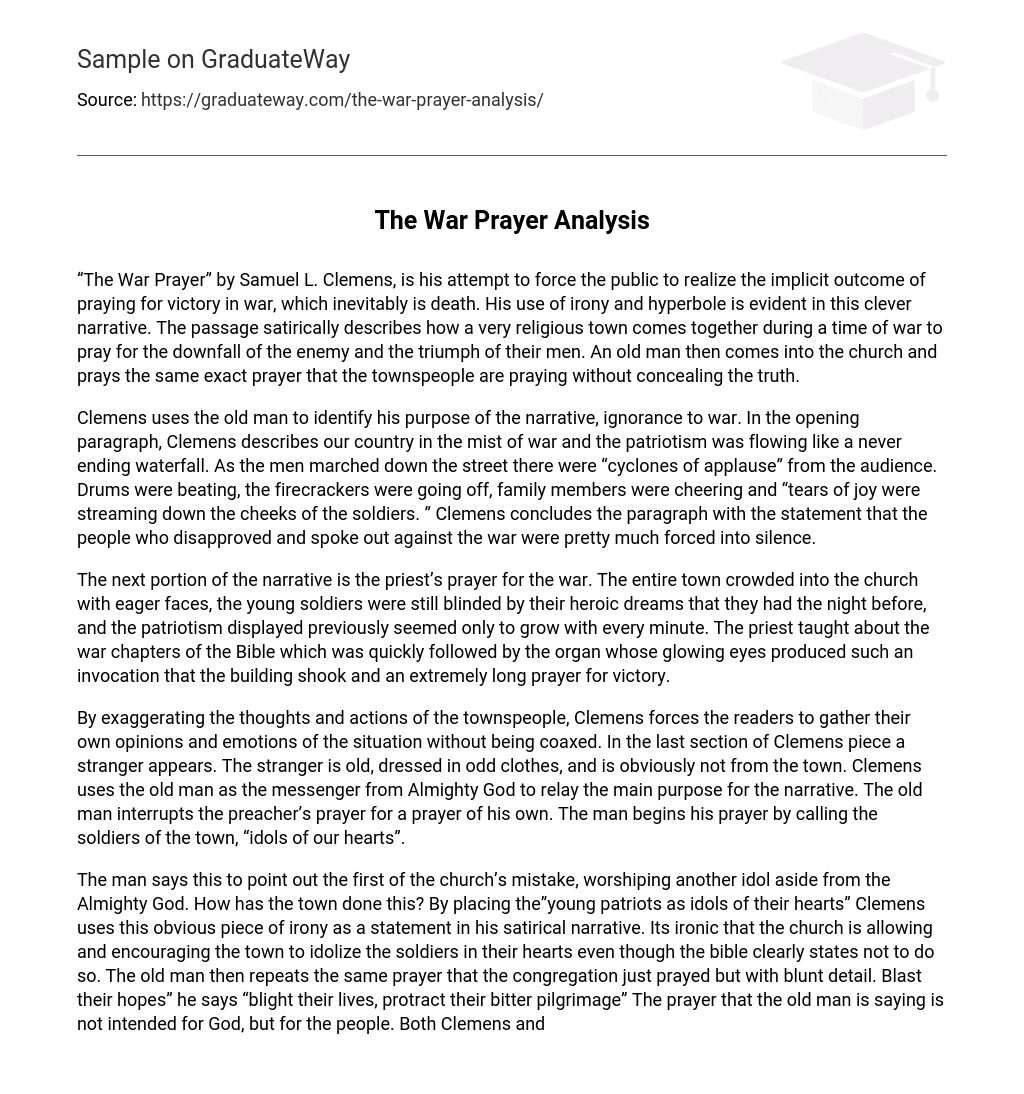“The War Prayer” by Samuel L. Clemens, is his attempt to force the public to realize the implicit outcome of praying for victory in war, which inevitably is death. His use of irony and hyperbole is evident in this clever narrative. The passage satirically describes how a very religious town comes together during a time of war to pray for the downfall of the enemy and the triumph of their men. An old man then comes into the church and prays the same exact prayer that the townspeople are praying without concealing the truth.
Clemens uses the old man to identify his purpose of the narrative, ignorance to war. In the opening paragraph, Clemens describes our country in the mist of war and the patriotism was flowing like a never ending waterfall. As the men marched down the street there were “cyclones of applause” from the audience. Drums were beating, the firecrackers were going off, family members were cheering and “tears of joy were streaming down the cheeks of the soldiers. ” Clemens concludes the paragraph with the statement that the people who disapproved and spoke out against the war were pretty much forced into silence.
The next portion of the narrative is the priest’s prayer for the war. The entire town crowded into the church with eager faces, the young soldiers were still blinded by their heroic dreams that they had the night before, and the patriotism displayed previously seemed only to grow with every minute. The priest taught about the war chapters of the Bible which was quickly followed by the organ whose glowing eyes produced such an invocation that the building shook and an extremely long prayer for victory.
By exaggerating the thoughts and actions of the townspeople, Clemens forces the readers to gather their own opinions and emotions of the situation without being coaxed. In the last section of Clemens piece a stranger appears. The stranger is old, dressed in odd clothes, and is obviously not from the town. Clemens uses the old man as the messenger from Almighty God to relay the main purpose for the narrative. The old man interrupts the preacher’s prayer for a prayer of his own. The man begins his prayer by calling the soldiers of the town, “idols of our hearts”.
The man says this to point out the first of the church’s mistake, worshiping another idol aside from the Almighty God. How has the town done this? By placing the”young patriots as idols of their hearts” Clemens uses this obvious piece of irony as a statement in his satirical narrative. Its ironic that the church is allowing and encouraging the town to idolize the soldiers in their hearts even though the bible clearly states not to do so. The old man then repeats the same prayer that the congregation just prayed but with blunt detail. Blast their hopes” he says “blight their lives, protract their bitter pilgrimage” The prayer that the old man is saying is not intended for God, but for the people. Both Clemens and the old man hope that the town people would realize that their prayer is just like one praying for pain and destruction to the enemy and that the people would finally understand that “If you pray for the blessing of rain upon your crop which needs it is possibly praying for a curse upon some neighbor’s crop” In the end the people write the old man off as crazy, scratch their heads, and disregard the message that he brought them.
The whole ending is ironic because there is a possibility that the people did understand what the man was saying but chose to feign ignorance to the effects of the war. Or maybe the people actually hadn’t understood what the man was saying because they could not see past the red curtain of ignorance that shielded them from the true nature of war. Clemens use of preposterous hyperbole and humorous irony came together to create “The War Prayer”, a satirical narrative on the ignorance some people maintain when it comes to war, for they do not see that when praying for victory is praying for the failure of another.





